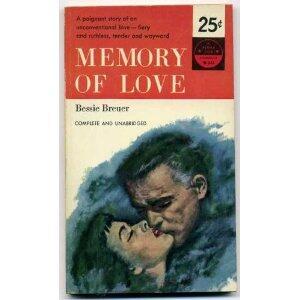Bessie Breuer’s play “Sundown Beach” opened on Broadway.
Bessie Breuer's Memory of Love published in 1935.
The first and only play by fiction writer Bessie Breuer was one of the newly formed Actor’s Studio's first productions. Directed by Elia Kazan and starring 23-year-old Julie Harris, it closed after only seven performances after being panned by critics as “emotional vaudeville.”
Breuer had much more success writing novels and short stories, four of which won the prestigious O. Henry Award for short fiction. Born Elizabeth Freedman in Cleveland in 1893, she grew up in St. Louis where her father was a rabbi, composer, and choirmaster, who died in the catastrophic 1918 flu epidemic.
She became a reporter on a St. Louis paper at the age of 16 and briefly studied journalism at Missouri State University. In 1911, she moved to New York and worked on the Tribune, first as editor of the Women's Page, then for a short time as editor of the Sunday edition. She left to fulfill her desire to be, as she considered it, "a real writer," an artist, rather than a journalist.
After a stint with the American Red Cross and Ladies Home Journal, she moved to France in the early 1920s and began writing fiction. She published six novels and many short stories. Her first novel, Memory of Love, was published in 1935 and made into a film in 1939.
The difficult choices facing women in post-suffrage America figure largely in Breuer's work. In an autobiographical sketch for Twentieth Century Authors, she explained how she saw her role as a woman who was unafraid to write sexually explicit fiction. "Somewhere Freud has said that psychologists have frank records of the male, but the female is shrouded and secreted and known to no man. That has been to me our great sin as writers, those of us who are women: that nowhere in our history as artists have we been the earth shakers because we dared not. So I try, oh, just a tiny bit, to write of what I truly see and have known; and not being a member of some powerful literary clan, am scolded for my lack of morality, or ignored."
As Vicki Lynn Hill writes on the Novelguide website, “Breuer's fiction will strike the modern reader as unexpectedly contemporary, in part because of Breuer's innovative narrative techniques and her interest in the relationship between woman's sexual and social identities.”
Sources: Adapted from Novelguide.com’s American Women Writers.



